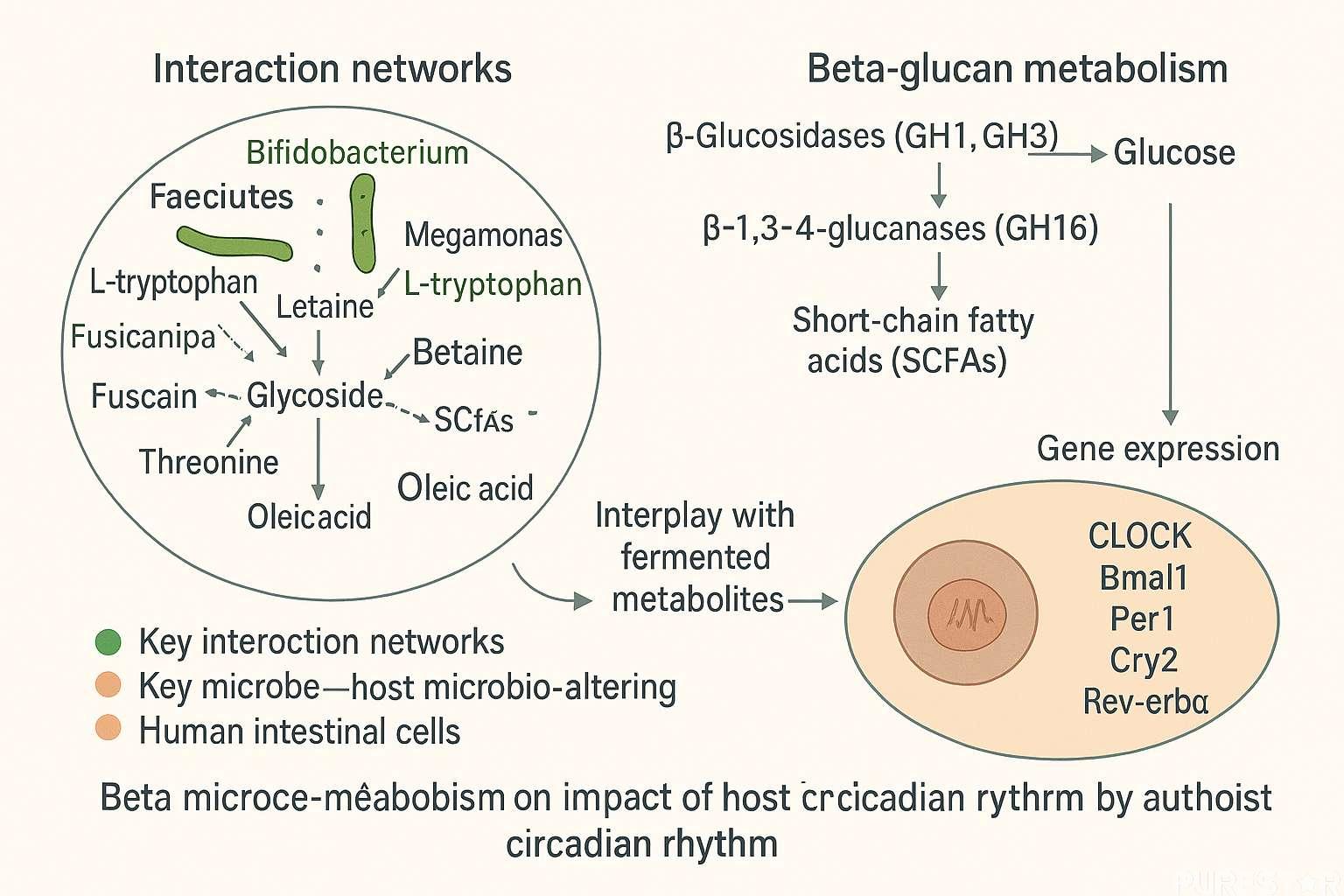Introduction
Oat beta glucan is a well-known soluble dietary fiber valued for its cholesterol-lowering and immune-supporting properties. Recent scientific findings reveal that its physiological influence extends far beyond traditional nutrition. Growing evidence shows that Oat beta glucan can reshape the gut microbiota, promote beneficial microbial metabolites, enhance short-chain fatty acid production, and support circadian rhythm regulation through microbiome-mediated pathways. These insights highlight oat beta glucan as a next-generation prebiotic ingredient for gut health, sleep support, mood balance, and metabolic wellness.
Oat Beta Glucan Improves Gut Microbial Composition
After ingestion, oat beta glucan is fermented by the gut microbiota. Research has shown that supplementation increases microbial diversity and enriches beneficial bacterial taxa, including Bifidobacterium, Bifidobacterium longum, Faecalibacterium, Parabacteroides, and members of Firmicutes. These bacteria are known for their role in producing short-chain fatty acids and maintaining intestinal integrity. At the same time, oat beta glucan reduces bacteria associated with dysbiosis, such as Dorea and Ruminococcus torques. This overall shift creates an intestinal environment that favors metabolic balance, improved immune regulation, and a healthier gut–brain axis.
Increased Production of Key Metabolites: L-Tryptophan, 5-HTP, and Related Compounds
The fermentation of oat beta glucan does more than alter bacterial populations; it generates several metabolites with substantial biological importance. Levels of L-tryptophan, D-tryptophan, 5-HTP, and glycitein all increase following fermentation. L-tryptophan and 5-HTP are essential precursors for serotonin and melatonin synthesis, which play major roles in stabilizing circadian rhythms, improving sleep quality, and supporting emotional balance. These findings indicate that oat beta glucan contributes to neurotransmitter-related pathways through microbial transformation.
Network analysis reveals strong correlations between genera such as Fusicatenibacter, Bifidobacterium, and Alistipes with metabolites including L-tryptophan and oleic acid. Oleic acid has been associated with circadian regulation in adipose tissues, suggesting an additional link between oat beta glucan and rhythm-related metabolic pathways.

SCFAs as a Key Mechanism in Circadian Rhythm Regulation
The breakdown of oat beta glucan relies on microbial enzymes such as β-glucosidases and β-glucanases. These enzymes convert the fiber into glucose and finally into SCFAs such as acetate, propionate, and butyrate. SCFAs are widely studied for their anti-inflammatory functions, energy metabolism roles, and contributions to gut barrier integrity. Recent studies show that SCFAs also influence the expression of core circadian clock genes in intestinal epithelial cells. Therefore, the increase in SCFA levels following oat beta glucan fermentation may represent an important mechanism by which this fiber supports circadian rhythm stability.
Fermentation Products Influence Circadian Rhythm Gene Expression
To determine whether microbial metabolites produced from oat beta glucan affect circadian rhythm, researchers exposed Caco-2 intestinal epithelial cells to fermentation supernatants. The results showed that fermentation products significantly increased the expression of clock genes including Bmal1, Clock, Per2, Per3, Cry1, Cry2, and Rev-erbα. In contrast, unfermented oat beta glucan alone did not produce similar effects, demonstrating that the microbiota and their metabolites are essential for rhythm modulation.
Fermentation supernatants from fecal microbiota produced comparable results, reinforcing the conclusion that key metabolic products derived from gut bacteria are responsible for stimulating rhythmic gene expression. Because these clock genes are linked to intestinal health and inflammatory regulation, the effects of oat beta glucan may extend to both circadian stability and gut barrier protection.
Conclusion
Current evidence shows that oat beta glucan significantly increases beneficial gut bacteria, enhances the production of key metabolites such as L-tryptophan and 5-HTP, stimulates SCFA formation, and promotes the expression of core circadian rhythm genes in intestinal epithelial cells. These interconnected pathways suggest that oat beta glucan may help alleviate circadian rhythm disruption and strengthen gut–brain axis communication through microbiome-mediated mechanisms. Although further research is needed to elucidate the detailed relationships between specific microbial taxa, their metabolites, and host circadian regulation, existing findings already provide a strong theoretical foundation for the development of oat beta glucan–based functional foods and nutraceutical products.
As consumer interest increases in gut health, sleep quality, stress resilience, and metabolic wellness, oat beta glucan continues to emerge as a scientifically supported, market-ready ingredient. Its ability to enhance microbiota composition, influence rhythmic gene expression, and support overall physiological balance positions it at the forefront of modern functional nutrition and future supplement innovation.
Contact:
Phone: 0086-13754204265
Tel: 0086-572-2157374
Email: sales@bulkbetaglucan.com
Add: No.235,Huanchengdong Road,Huzhou,Zhejiang,China